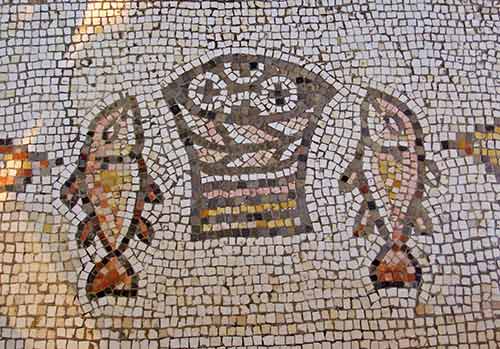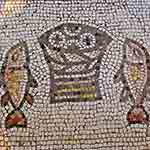
Then the Jews began to complain about him because he said, ‘I am the bread that came down from heaven.’ John 6:41
Ἐγόγγυζον οὖν οἱ Ἰουδαῖοι περὶ αὐτοῦ ὅτι εἶπεν Ἐγώ εἰμι ὁ ἄρτος ὁ καταβὰς ἐκ τοῦ οὐρανοῦ
Ἰουδαῖοι is (mis)translated here and elsewhere as “Jews”. The better translation, with possibly some exceptions, is “Judeans”. Judeans are from the region (and often the tribe) of Judea in the South where the city Jerusalem, the Temple, and the headquarters of the Roman Governor are. Judeans, then, are often the elite with power, wealth, and privilege dependent on collaboration with the Roman occupiers.
John uses “Israel” more regularly to refer to the people looking back to Abraham and Moses. “Jews” not only mistranslates the original, it presents an understanding in the directly opposite direction to what the author intends. The reference to Ἰουδαῖοι is to an opposing subgroup within Israel, whereas the current usage of “Jews” gives the impression of the larger group of which Galileans (and Jesus) were a part.
That John refers, hence, to Festivals of the Judeans (John 2:13; 5:1; 6:4; 7:2; 11:55) makes sense – these are festivals requiring pilgrimage to the Temple in Jerusalem, in Judea.
The exception, in the Chapter we are working with, is John 6:4:
Now the Passover, the festival of the Jews, was near.
Jesus is speaking in a Galilean synagogue (6:59) at a time shortly before the pilgrimage to Jerusalem for the Passover would take place. Hence, John points out this time of year, connecting John 6 to the Passover.
The nonsense of mistranslating Ἰουδαῖοι as “Jews” is seen vividly in the next chapter:
After this Jesus went about in Galilee. He did not wish to go about in Judea because the Jews were looking for an opportunity to kill him. (John 7:1).
This would make absolutely no sense whatsoever if the Jews were identified with those of Israel in Galilee. John 11:7-8, similarly, only makes sense with the interpretation I am arguing for:
Then after this he said to the disciples, ‘Let us go to Judea again.’ The disciples said to him, ‘Rabbi, the Jews were just now trying to stone you, and are you going there again?’
To be continued…
If you appreciated this post, do remember to like the liturgy facebook page, use the RSS feed, and sign up for a not-very-often email, …




Whether intentional or not, the message I got growing up in a low-church Calvinist environment was that Jesus was a white European that god somehow randomly decided to drop into a kingdom called Israel, and that the important thing was to listen to what Jesus said, because where he lived and ministered didn’t really matter.
As an adult in the Anglican tradition, I now am in the Borg/Crossan camp, seeing that God’s intention was for Jesus to appear precisely in that time and context, in order to preach the overturn of domination systems in favor of god’s kingdom on earth.
In that light, it seems inexcusable that we leave the translation error of “the Jews” in our texts, because not only does it lead to pointless anti-Semitism, it completely missed the mark of what the evangelists were talking about.
Thanks, Jonathan. It is difficult for me to understand how such a mistranslation survives in our post-Shoah world. The only use of retaining it in church reading is to visit together the abuse of and within our tradition – continuing to this day. Blessings.
You make an excellent point here. In the 1st Century Judaism as we understand it had not yet developed and therefore the term “Jew” in its modern usage is inappropriate and misleading. I note that in his illuminating translation of the New Testament, David Bentley Hart makes the same rendering of Ioudaioi as you do.
Thanks, Kelvin, especially for making the David Bentley Hart connection – I own his translation but have not yet worked with it. Blessings.
Yes, a sometimes overlooked distinction. Also comes out when Peter is told his accent betrays him, and the Judaeans tell Jesus he is an ignorant Galilean.
Yet the way “Jew” in John is often used to say there is anti-semitism in John. I’ve never been convinced as Jesus was a Jew, This is apart from suggestions it means Judeans.
If we can accept that our current understanding of the word “Jew” cannot be directly read back into John’s use of “Ἰουδαῖοι”, Michael – which I think is fair (and so translating Ἰουδαῖοι as “Jew” is not appropriate) – we Christians also need to acknowledge the place of John’s Gospel in the development of antisemitism. Ἰουδαῖοι can be used to mean “Jew”, and context determines whether it does. John uses Ἰουδαῖοι more than any other New Testament author by far. John presents strongly the antipathy of the Ἰουδαῖοι along with the Roman authorities to Jesus and his message. That his usage reflects rethinking the relationship between the Johannine community and the synagogue is speculative. Certainly, liturgical usage of John – being read on Good Friday – is part of this history we Christians need to acknowledge. Blessings.
While I have long argued the general point you’re making here, Father, the case is not so clear-cut in the eyes of many Jewish and Christian scholars of John’s Gospel. I offer a link to Marginalia’s symposium on ‘Jews or Judeans’ to point to informed debate on the topic among specialists: https://marginalia.lareviewofbooks.org/jew-judean-forum/ .
Thanks. Clearly, the case is not clear-cut – or NRSV and other generally-reliable translations wouldn’t be doing this. Your link doesn’t work, sorry. Blessings.
Very odd: it works when I click on it. If the link below works, you will find an internal link to the forum at the bottom of the page:
https://marginalia.lareviewofbooks.org/category/features/forum/page/6/
and in the unlikely event that anyone be curious about my observations on the topic, cf. “According to Whose Law? Josephus, Aristobulus, and the Νόμοι τῶν Ἰουδαίων,” Journal for the Study of Pseudepigrapha 14 (1996), 15-21, and “Matthew’s Readers, Power, and Ideology,” in my book entitled Faithful Interpretation.
Wonderful, thanks, for all those observations and pointing to resources. And, yes, the links are working now! Blessings.
This discussion prompted me to check “The Inclusive New Testament” (Priests for equality) which instead of “Jews” has “Temple authorities” which could be helpful to some, including me!
Thanks, Ian. Maybe we should produce a list from different translations on this. Blessings.
So, Bosco… what’s a priest or deacon to do? I’ve consistently held the US Catholic Lectionary in disdain because of these issues (aside from the NAB not being my cup of translational tea). I’m considering switching to it, though, since all the other parishes in my diocese use it. (I currently use the NLT Second Edition in a locally published volume.)
Should I edit the reading? Comment to open the homily? What would your pastoral recommendation be?
Great question, Fr Robert. I can only give you the approach I use in my context, and I understand others will approach this differently. I and my community use the NRSV. I do not edit it but when situations like this arise, I use it as an opportunity to teach and give my reasons for disagreeing with the translation, understanding that there will be some also who might disagree with my interpretation. Much is gained in the conversations that follow. Blessings.